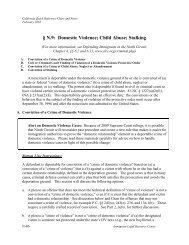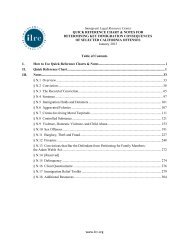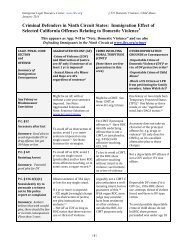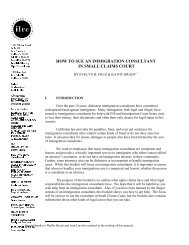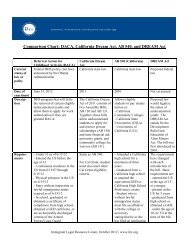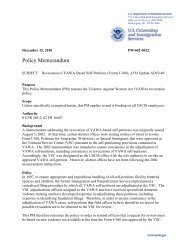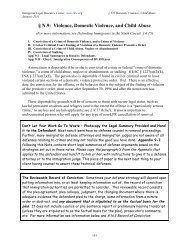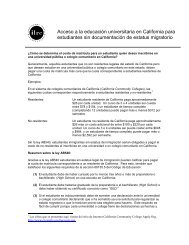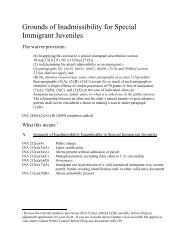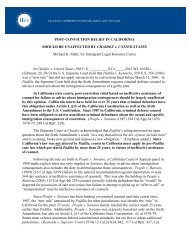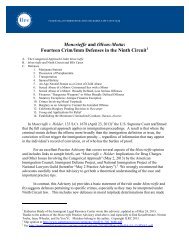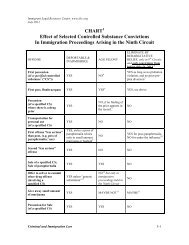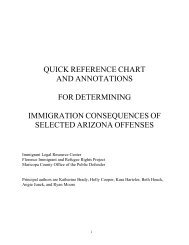quick reference chart and notes for determining immigration - ILRC
quick reference chart and notes for determining immigration - ILRC
quick reference chart and notes for determining immigration - ILRC
Create successful ePaper yourself
Turn your PDF publications into a flip-book with our unique Google optimized e-Paper software.
Cali<strong>for</strong>nia Quick Reference Chart <strong>and</strong> Notes<br />
February 2010<br />
Plead to attempt in order to lower the potential sentence to under one year. Attempt<br />
does not prevent an offense from being classified as a crime involving moral turpitude. In<br />
general, attempt takes on the character of the principal offense <strong>for</strong> <strong>immigration</strong> purposes so that,<br />
e.g., attempt to commit theft is a crime involving moral turpitude. In fact, attempt is inconsistent<br />
with reckless or negligent intent, <strong>and</strong> in some cases might make it more likely <strong>for</strong> an offense to<br />
be held a CMT.<br />
However, attempt does offer a way to avoid becoming deportable <strong>for</strong> conviction of one<br />
crime involving moral turpitude <strong>for</strong> which the potential sentence is one year or more. For most<br />
offenses, attempt carries half the potential sentence of the principal offense, under P.C. § 644(b).<br />
Attempt to commit a one-year misdemeanor, or a felony wobbler that is reduced to a<br />
misdemeanor, carries a potential sentence of six months. By using creative sentencing strategies,<br />
e.g. waiving credit <strong>for</strong> time served, counsel may be able to meet the prosecution’s dem<strong>and</strong>s <strong>for</strong><br />
sentence while still pleading to attempt. See § N.4 Sentence Solutions, supra.<br />
Do not plead to attempt to commit an offense involving fraud or deceit where there was a<br />
potential loss to the victim or government of $10,000 or more. This might make it more likely<br />
<strong>for</strong> the offense to be held an aggravated felony. See Note: Burglary, Fraud.<br />
2. Conviction of two crimes involving moral turpitude after admission, that are not part of<br />
a single scheme<br />
A noncitizen is deportable <strong>for</strong> two or more convictions of crimes involving moral<br />
turpitude that occur anytime after admission, unless the convictions are “purely political” or arise<br />
in a “single scheme of criminal misconduct” (often interpreted to exclude almost anything but<br />
two charges from the same incident).<br />
Example: Stan was admitted to the U.S. in 1998. He was convicted of assault with a deadly<br />
weapon in 2002 <strong>and</strong> passing a bad check in 2006. Regardless of the potential or actual<br />
imposed sentences, he is deportable <strong>for</strong> conviction of two moral turpitude offenses since his<br />
admission.<br />
C. Ground of Inadmissibility, 8 USC § 1182(a)(2)(A)<br />
A noncitizen is inadmissible who is convicted of one crime involving moral turpitude,<br />
whether be<strong>for</strong>e or after admission. There are two important exceptions to the rule.<br />
Petty offense exception. 101 If a noncitizen (a) has committed only one moral turpitude<br />
offense ever, (b) the offense carries a potential sentence of a year or less, <strong>and</strong> (c) the “sentence<br />
then falls out of lawful status <strong>for</strong> some years, <strong>and</strong> then adjusts status, the Ninth Circuit has not held as to whether the<br />
adjustment re-starts the five year period. See discussion in Defending Immigrants in the Ninth Circuit, § 4.5.<br />
101 8 USC § 1182(a)(2)(A)(ii)(II).<br />
N-68 Immigrant Legal Resource Center



